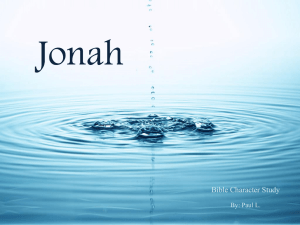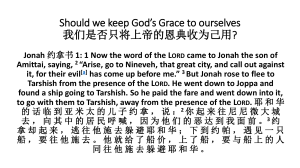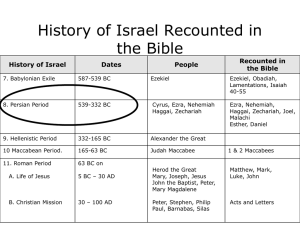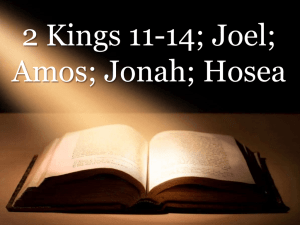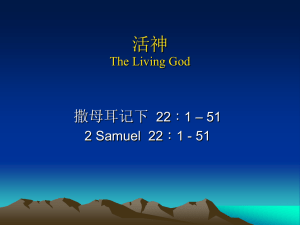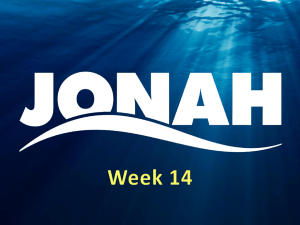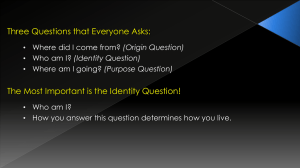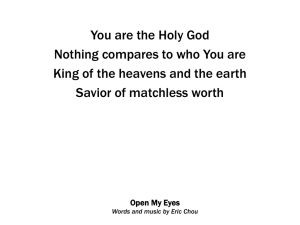Jonah - Week 10 - Redeemer Orthodox Presbyterian Church
advertisement
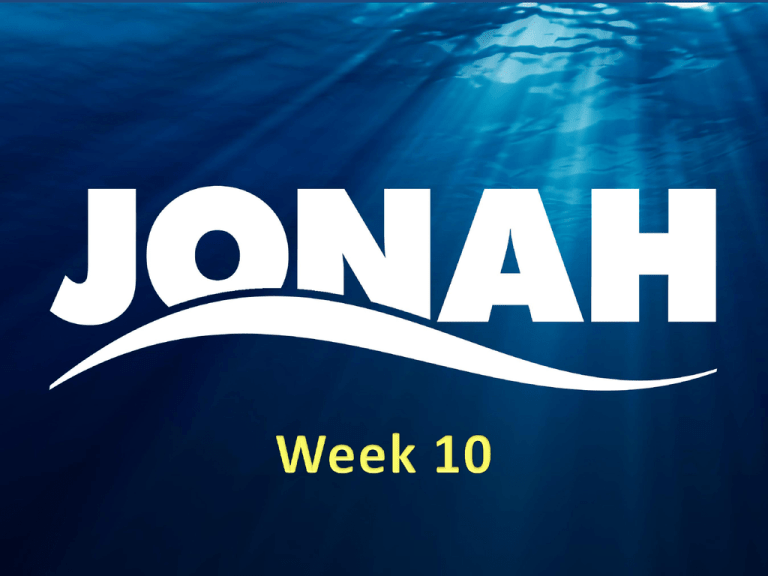
Auto Pilot: Engaged Have you ever put or lived your Christian life on automatic pilot? There is usually not a switch we turn on to live our spiritual walk without thought/awareness. Spiritual decline often happens so slowly that we hardly notice. What are some warning signs? • • • • • • Worship becomes remote Prayer becomes repetitive The Lord's Table becomes a habit Hearing the Word becomes routine Fellowship becomes a burden We withhold/reluctantly give our tithes, offerings What can we do to turn off the auto pilot? Quick Review of Week 9 …. The Storm at Sea (Jonah 1:13-16) Jonah 1:13-16 13 Nevertheless, the men rowed hard to get back to dry land, but they could not, for the sea grew more and more tempestuous against them. 14 Therefore they call out to the LORD, “O LORD, let us not perish for this man's life, and lay not on us innocent blood, for you, O LORD, have done as it pleased you.” 15 So they picked up Jonah and hurled him into the sea, and the sea ceased from its raging. 16 Then the men feared the LORD exceedingly, and they offered a sacrifice to the LORD and made vows. Why didn’t the mariners immediately throw Jonah overboard? What does this reveal about them? What was their intent in trying to reach land? Why were they unsuccessful? Rowing Harder • The ship's crew did not want to give Jonah up, and they tried their best to row back to the shore • Their desire to spare Jonah's life seems admirable, but it was a direct contradiction to the Word of God • God had spoken through the prophet: The life of the man who spoke the Word must be given up if the crew were to be saved • But the first instinct of the crew was to refuse the sacrifice; they felt that they could get through the storm of God's judgment, and so they rowed harder • God has spoken through the prophet, promising deliverance from the storm of judgment to the entire crew through the sacrifice of one man who is willing to lay down his life • But these men think that they can save themselves by their own effort • They believe that they can survive the storm without the sacrifice “But they could not …” • These four words are the turning point of their story • When the crew realized that they could not beat the storm, they turned in their desperation to what God had said through the prophet and they staked their lives on the sacrifice of Jonah • Do you see how beautifully this points to Jesus Christ? • The storm of God's judgment is stronger than you are; you do not have the ability to survive this storm by your own effort, no matter how hard you try • The storm of God's judgment will wreck you, unless you are saved by the sacrifice of Someone else • On the cross, Jesus gave His life to deliver you from God's righteous judgment against your sin. Cast out by men and forsaken by the Father, He offered Himself as the sacrifice that would placate the wrath of God on your behalf. • At its heart, the gospel is about God's storm and His sacrifice; Christ was thrown into the storm of God's judgment so that, through His sacrifice, you would be saved. Jonah 1:13-16 13 Nevertheless, the men rowed hard to get back to dry land, but they could not, for the sea grew more and more tempestuous against them. 14 Therefore they call out to the LORD, “O LORD, let us not perish for this man's life, and lay not on us innocent blood, for you, O LORD, have done as it pleased you.” 15 So they picked up Jonah and hurled him into the sea, and the sea ceased from its raging. 16 Then the men feared the LORD exceedingly, and they offered a sacrifice to the LORD and made vows. The sailors want to remind God that throwing Jonah overboard is Jonah’s solution, not theirs • They acknowledge that murder is a capital crime for which they could perish if God held them responsible • The sailors don’t want to be held responsible if Jonah has misled them so that they are making the wrong move • They want to be sure they are doing the will of Yahweh Our Guilt in the Sacrifice • Why didn't Jonah throw himself overboard and save the crew from this anxiety? • The great events of the Bible story were shaped by God to throw light on what we most need to understand about our Lord Jesus Christ • Jesus did not take His own life; He was crucified, and that truth is pictured in the crew throwing Jonah overboard • As they were guilty of sin in throwing a man who had done them no wrong overboard, so we, as members of the human race, are guilty of sin in the crucifixion of the Son of God • Yet the death in which we incur this guilt is, in God's amazing grace, the means of our salvation! The Fear of the Lord • Verse 5: The sailors are "afraid" of the storm • Verse 10: The sailors are "terrified" of God: they're now more afraid of the God who's in charge of the storm than they are of the storm itself. • Verse 16: They "greatly feared the LORD." Their sacrifice and vows show this means having right and awed respect for someone, rather than being terrified of them. Thus, Jonah in verse 9 and the sailors in verse 16 make the same confession of faith and direct the same worship to Yahweh Through the same faith and worship, both Jonah, the Israelite, and the Gentiles have equal standing in the eyes of Yahweh Jonah’s anti-missionary activity has ironically resulted in the conversion on non-Israelites A Long Time Ago … In a Place Far, Far Away • There was a Worldwide Missionary Conference held in Edinburgh in 1910 • It was a massive ecumenical venture, one of the most comprehensive attempts to ignite a fresh passion for world missions in the entire history of the church • Numerous papers were written that included questionnaires, missionary responses from the field, transcripts, area reports, reports to commissions, minutes, published findings, etc. • Ploughing through the history of this massive effort to engage the church with the needs of the world, it became obvious that nothing much had been accomplished beyond committees, papers and reports • This extraordinary effort made very little difference … It was a massive disappointment • But if all this effort couldn't make a difference, what would? Gospel: A-through-Z • Denney's point was simple: • When your heart is gripped by the love of God poured out in the cross … • When you see the extent of that love in the propitiation by which Christ became the sacrifice for your sin, bearing wrath and entering hell for you … • And when you are convinced that this Christ offers Himself in redeeming love to others who do not yet know Him … • Then a passion will be lit in your heart to pursue a Godcentered life • The gospel is not simply what non-Christians must believe in order to be saved, but after they believe, they advance to the deeper theological waters of the Reformed faith • The gospel is not simply the ABCs of Christianity, it is the A-through-Z of Christianity • The gospel doesn’t just ignite the Christian life; it’s the fuel that keeps Christians going every day (Colossians 1:6) … Now Week 10 Herman Melville, Moby Dick A Warning Against Escapism “There is a wisdom that is woe; but there is a woe that is madness. And there is a Catskill eagle in some souls that can alike dive down into the blackest gorges, and soar out of them again and become invisible in the sunny spaces. And even if he forever flies within the gorge, that gorge is in the mountains; so that even in his lowest swoop the mountain eagle is still higher than other birds upon the plain, even though they soar.” Transformer • This is the story of a mature believer who had stopped praying and, having stopped, did not know how to get started again • After his secret sin had been exposed, Jonah received revelation from God that the storm would cease if the crew threw him into the water • Jonah spoke to the crew about God; he preached and he prophesied but he could not bring himself to pray • But a great transformation took place when Jonah was in the water. God broke through the barriers that had locked this man into despair. Hope was born and, out of that hope, Jonah began to pray. • Let’s see how this transformation happened The Structure of the Book of Jonah Scene 1: Jonah’s First Call (1:1-3) Scene 2: The Storm at Sea (1:4-16) Scene 3: Jonah’s Deliverance & Prayer (1:17 – 2:10) Scene 4: Jonah’s Second Call (3:1-3a) Scene 5: Jonah’s Preaching Converts (3:3b-10) Nineveh & Yahweh Changes His Verdict Scene 6: Jonah’s Response to Yahweh’s (4:1-3) Change of Verdict to Save Nineveh Scene 7: Yahweh’s Provisions and Jonah’s Response (4:4-11) Jonah 1:17 – 2:10 SCENE 3 1:17And the LORD appointed a great fish to swallow up Jonah. And Jonah was in the belly of the fish three days and three nights. 2:1Then Jonah prayed to the LORD his God from the belly of the fish, 2saying, “I called out to the LORD, out of my distress, and he answered me; out of the belly of Sheol I cried, and you heard my voice. 3For you cast me into the deep, into the heart of the seas, and the flood surrounded me; all your waves and your billows passed over me. 4Then I said, ‘I am driven away from your sight; yet I shall again look upon your holy temple.’ 5The waters closed in over me to take my life; the deep surrounded me; weeds were wrapped about my head 6at the roots of the mountains. I went down to the land whose bars closed upon me forever; yet you brought up my life from the pit, O LORD my God. 7When my life was fainting away, I remembered the LORD, and my prayer came to you, into your holy temple. 8Those who pay regard to vain idols forsake their hope of steadfast love. 9But I with the voice of thanksgiving will sacrifice to you; what I have vowed I will pay. Salvation belongs to the LORD!” 10And the LORD spoke to the fish, and it vomited Jonah out upon the dry land. Jonah 1:17 – 2:10 SCENE 3 1:17And the LORD appointed a great fish to swallow up Jonah. And Jonah was in the belly of the fish three days and three nights. 2:1Then Jonah prayed to the LORD his God from the belly of the fish, 2saying, “I called out to the LORD, out of my distress, and he answered me; out of the belly of Sheol I cried, and you heard my voice. 3For you cast me into the deep, into the heart of the seas, and the flood surrounded me; all your waves and your billows passed over me. 4Then I said, ‘I am driven away from your sight; yet I shall again look upon Jonah 1:17 and 2:10 bracket this scene in Jonah. your holy temple.’ 5The waters Whatclosed happens Jonah inmy these twodeep verses? in overtome to take life; the surrounded me; weeds wereWhy wrapped about my head 6atthese the roots of the mountains. does God perform actions? I went down to the land whose bars closed upon me forever; yet you brought up my life from the pit, O LORD my God. 7When my life was fainting away, I remembered the LORD, and my prayer came to you, into your holy temple. 8Those who pay regard to vain idols forsake their hope of steadfast love. 9But I with the voice of thanksgiving will sacrifice to you; what I have vowed I will pay. Salvation belongs to the LORD!” 10And the LORD spoke to the fish, and it vomited Jonah out upon the dry land. The Big Fish • When I first learned the story of Jonah, I pictured God's extraordinary sea creature arriving to rescue the prophet as soon as he hit the water • But a closer look at the story has convinced me it wasn't like that … God allowed Jonah to go to the bottom before He sent the fish • When Jonah was in the water he felt sure he would die; when he was in the fish he was sure he would live • The belly of the fish was not a place of trauma for Jonah; it was a place of deliverance Jonah 1:17 And the LORD appointed a great fish to swallow up Jonah. And Jonah was in the belly of the fish three days and three nights. Why this specific means ofwe returning Jonah to his Whatdid Why isdid it God significant the use sailors that think the would first thing happen when are told they ofthrew Jonah Jonah after appropriate of service? not ahas large bird or some other overboard? he is thrownplace into the waves is Why that God already prepared a means? What fish todid save Jonah him expect from drowning? to happen? ••What The fish provided for instruction theaLord. The As when does He theimpeded wordtime “appointed” Jonah’s flight (manah byfrom hurling in Hebrew) storm tell into usbelly the of a in fish may not bedid a happy place tothe live, but isand a good place about sea 1:4, God? soWhat again God God is aappoint step ahead of fishJonah to itdo? acts is suchtoa learn. way as eventually get the reluctant prophet to Nineveh with His •message In addition, the Lord does not usually protect us from the of warning consequences of our own choices and actions. Jonah had chosen the sea as his escape route; it is there that the Lord awaits him. What does the word “swallow” suggest about Jonah’s situation? Swallowed (bala’ in Hebrew) This word almost always has a hostile connotation in the OT: • Pharaoh & his chariots are swallowed in the Red Sea (Exodus 15) • The psalmist begs Yahweh not to allow the deep to swallow him up (Psalms 21; 35; 69; and 124) • Swallowed up is synonymous with being annihilated (Lamentations 2) • Ephraim [Israel – Jonah’s nation] was gulped down as a person would eat a ripe fig (Isaiah 28) in God’s coming judgment on her • Jerusalem is swallowed, digested, and vomitted out by Babylon (Jeremiah 51) in her future judgment The followers of Korah are swallowed up by the earth and taken down to Sheol (Numbers 16; Psalm 106) as punishment Sinners ambush the innocent and like Sheol swallow them alive and whole, like those who go down to the pit (Proverbs 1:12) Thus, when Jonah is swallowed by the great fish, he and his audience would initially interpret this to mean death and entering the underworld of Sheol Jonah 1:17 And the LORD appointed a great fish to swallow up Jonah. And Jonah was in the belly of the fish three days and three nights. How long did Jonah reside in the belly of the great fish? Why was he there for this specific length of time? To what New Testament reality does this point? “three days and three nights” • This expression attracts our attention due to its use in the NT as a description of Jesus’ time in the grave and the “sign” that the Ninevites and Jesus’ audience both witnessed (Matt 12:40; 16:4; Luke 11:29-30, 32) • We will address this issue in a future class But what did this phrase mean to Jonah’s readers? • There is only one reference elsewhere in the OT that uses “three days and three nights” • In 1 Samuel 30:12-13, a sick Egyptian, left for dead by his Amalekite master after having raided Ziklag, is too weak to speak after having been without food and water for three days and three nights • Taken together the expression probably stands for the longest period of time one can reasonably be expected to survive in a situation like Jonah's or like that of the abandoned slave Jonah 1:5 and 2:1 1:5 …But Jonah had gone down into the inner part of the ship and had lain down and was fast asleep. 2:1 Then Jonah prayed to the LORD his God from the belly of the fish… Where was the prophet in each of these verses? What does this tell us about him? • Jonah finds himself in essentially the same position • This is the narrator’s way of indicating that Jonah repeatedly is in a state of isolation (we will see this again in chapter 4) What is the significance of Jonah 2:1? • Finally, we see Jonah’s willingness to pray • He prayed not only to the Lord, as the sailors did, but to “the LORD his God” Jonah’s Prayer 2“I called out to the LORD, out of my distress, and he answered me; out of the belly of Sheol I cried, and you heard my voice. 3For you cast me into the deep, into the heart of the seas, and the flood surrounded me; all your waves and your billows passed over me. 4Then I said, ‘I am driven away from your sight; yet I shall again look upon your holy temple.’ 5The waters closed in over me to take my life; the deep surrounded me;6weeds were wrapped about my head at the roots of the mountains. I went down to the land whose bars closed upon me forever; yet you brought up my life from the pit, O LORD my God. 7When my life was fainting away, I remembered the LORD, and my prayer came to you, into your holy temple. 8Those who pay regard to vain idols forsake their hope of steadfast love. 9But I with the voice of thanksgiving will sacrifice to you; what I have vowed I will pay. Salvation belongs to the LORD!” • We are dealing here with the prayer of Jonah which is also a psalm • There are many types/genre of psalms found in the bible. • The two main types being laments (prayers in times of need) and songs of praise (worship in times of joy). There are also psalms of thanksgiving, wisdom psalms, royal psalms, and others. What kind of psalm is found here? Psalm of Thanksgiving • Jonah's surprised (and possibly breathless) prayer is a typical psalm of thanksgiving with: (1) an introduction that attests that his prayer for deliverance was answered (verse 2) (2) a recounting of the crisis and of his deliverance from it (verses 3-7), and (3) a subsequent vow to worship God for that deliverance (vv. 8-9) 2“I Introduction called out to the LORD, out of my distress, and he answered me; out of the belly of Sheol I cried, and you heard my voice. 3For Crisis and Deliverance you cast me into the deep, into the heart of the seas, and the flood surrounded me; all your waves and your billows passed over me. 4Then I said, ‘I am driven away from your sight; yet I shall again look upon your holy temple.’ 5The waters closed in over me to take my life; the deep surrounded me; weeds were wrapped about my head 6at the roots of the mountains. I went down to the land whose bars closed upon me forever; yet you brought up my life from the pit, O LORD my God. 7When my life was fainting away, I remembered the LORD, and my prayer came to you, into your holy temple. 8Those Vow to Worship who pay regard to vain idols forsake their hope of steadfast love. 9But I with the voice of thanksgiving will sacrifice to you; what I have vowed I will pay. Salvation belongs to the LORD!” Jonah’s Psalm • Experts view Jonah’s response to God in two completely •There aredifferent severalways: 1. Someand see Jonah words phrases praising God despite his repeated within this difficulties because God psalm. has given him a second What word (s) are the chance 2. Others see Jonah in most frequent? denial, when he • “I” ispraising used 10x should be lamenting and • “me” is used 7x repenting … he is familiar What doesused this in with prayers suggestbut about this the worship, he misses spirit behind them and psalm of Jonah? misapplies them in his own situation What do you think and why? Let’s talk about me • Normally a song of thanksgiving begins with the singer praising God (or exhorting his fellow worshippers to praise God) for His goodness and mercy • … Jonah skips this part and begins by focusing on his own plight; Jonah makes us see his self-centeredness • In addition, in psalms when sin is recognized as the cause of the writer's duress, he makes that element primary and seeks deliverance from sin before anything else (as in Psalm 32) • This is followed by the psalmist again emphasizing God as his only deliverer • Jonah, however, although he is unquestionably in dire straits because of his own disobedience, does not even recognize his sin and so utters not a word of confession • What is more, Jonah limits his description of God’s merciful deliverance to two poetic lines (last half of verse 7) out of about twenty-five! • The one praying for deliverance is more prominent in Jonah’s prayer than God the deliverer Jonah’s Prayer and the Psalms Jonah 2:2 – “I called out to the LORD, out of my distress, and he answered me; out of the belly of Sheol I cried, and you heard my voice. • Psalm 18:6 – “In my distress I called upon the LORD; to my God I cried for help. From his temple he heard my voice, and my cry to him reached his ears.” • Psalm 120:1 – “In my distress I called to the LORD, and he answered me.” • Psalm 86:13 – “For great is your steadfast love toward me; you have delivered my soul from the depths of Sheol.” Declarative Psalm of Thanksgiving: Introduction – Jonah 2:2 “I called out to the LORD, out of my distress, and he answered me; out of the belly of Sheol I cried, and you heard my voice. • In Hebrew, the first word in Jonah’s psalm/prayer is “called out.” Where have heardJonah’s this verbprayer before? What Which iscame thewesubject/request first: of Jonah’s or God’s prayer deliverance? here? This is the same verb that Yahweh (1:2), the captain (1:6), and the Why Whatdoclue youdoes thinkthis Jonah givedoes us asnot to Jonah's stick with state hisof intention mind and to sailors (1:14) used in seeking help to alleviate life-threatening danger die thefor reason his sin? whyWhy he prayed does he after even three praydays to beand delivered? three nights? What irony is revealed here? seems 1that Jonah’s desire totoescape what hetothought • •InItChapter Jonah was unwilling “call” (preach) Nineveh to to save God’s sentence of or judgment against him betrays a personal itbe from divine judgment to “call” upon God to save the foundering penchant for grace when his life is on the line ship And Jonah’s life is very Yahweh, important to him, this prayer • •But now, Jonahown is finally calling fulfilling Hisas command that heshows “call.” Yet ironically, the prophet is only calling out for his own sake! • Jonah 2:2 – “I called out to the LORD, out of my distress, and he answered me; out of the belly of Sheol I cried, and you heard my voice. • Sometimes Sheol refers to the place where all people go after death (see Genesis 37:35; Job 7:9; Psalm 89:48) • In other passages Sheol is the destination of unbelievers (see Numbers 16:30, 33 and Psalm 9:17); they are cut off from Yahweh and forgotten • In still other parts of the Old Testament, true believers in the LORD experience Sheol when they suffer divine punishment, such as tragedy, suffering, calamity, or untimely death (such as Jacob in Genesis 44:29 and King Hezekiah in Isaiah 38:10) What is the connection between Sheol and the concept of the presence of the LORD that we studied earlier? • Sheol in its essence represents separation from God; theologically, it is the opposite of Yahweh’s presence Which understanding of Sheol best describes what Jonah experienced as he was drowning? Should we interpret the belly of the great fish to be Sheol? Explain. Declarative Psalm of Thanksgiving: Crisis and Deliverance – Jonah 2:3-7 3For you cast me into the deep, into the heart of the seas, and the flood surrounded me; all your waves and your billows passed over me. 4Then I said, ‘I am driven away from your sight; yet I shall again look upon your holy temple.’ 5The waters closed in over me to take my life; the deep surrounded me; weeds were wrapped about my head 6at the roots of the mountains. I went down to the land whose bars closed upon me forever; yet you brought up my life from the pit, O LORD my God. 7When my life was fainting away, I remembered the LORD, and my prayer came to you, into your holy temple. Jonah’s Prayer and the Psalms Jonah 2:3 – “For you cast me into the deep, into the heart of the seas, and the flood surrounded me; all your waves and your billows passed over me.” • Psalm 69:1-2 – “Save me, O God! For the waters have come up to my neck. I sink in deep mire, where there is no foothold; I have come into deep waters, and the flood sweeps over me.” • Psalm 69:14 – “Deliver me from sinking in the mire; let me be delivered from my enemies and from the deep waters.” • Psalm 88:6 – “You have put me in the depths of the pit, in the regions dark and deep.” • Psalm 42:7 – “Deep calls to deep at the roar of your waterfalls; all your breakers and your waves have gone over me.” Jonah 2:3 For you cast me into the deep, into the heart of the seas, and the flood surrounded me; all your waves and your billows passed over me. • Having Jonah 1:15 madeclearly clear that shows hethat holds it was God the responsible crew thatfor threw his Jonah distress, overboard; how does however, Jonah show here how in Jonah this fact 2:3 the affects prophet him?says God • He “cast says[him] that the intoflood the deep, “surrounds” into thehim heart and ofthat the seas” all of Was God's Jonah waves telling andthe billows truth“passed (an orthodox over” him statement of God’s sovereignty) • Once again, or Jonah was heassociates blaming the GodLORD very for closely his predicament? with these What threats does to Jonah his lifenot by adding say about possessive his predicament? pronouns to them: • they He makes are “your no mention waves” and of his “your ownbillows” role in the events that brought To whathim extent here, is especially God responsible his flight forfrom the troubles the divine we commission experience and in our hislives? failure to repent while onboard The Deep (tehom) Genesis 1:2 – “The earth was without form and void, and darkness was over the face of the deep. And the Spirit of God was hovering over the face of the waters.” Jonah 2:3 – ”For you cast me into the deep, into the heart of the seas, and the flood surrounded me; all your waves and your billows passed over me.” Genesis 1:2, like Jonah 2:3, uses the Hebrew word tehom. The ESV translates this word as “the deep.” What is the context of the word tehom in Genesis 1:2? • This refers to the primeval ocean that existed near the beginning of creation; it is the state of the earth prior to God’s speaking, lifegiving acts of creation What is its context in Jonah 2:3? What does the use of the word tehom in Jonah 2:3 tell us about the effect of sin on Jonah and on us? • His condition is presented as a reversal of creation, that is, death
